How have Lumley's Gurkhas fared?
- Published
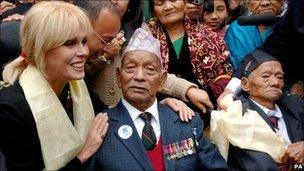
Joanna Lumley's campaign for fairer treatment for retired Gurkha soldiers has so far led to an estimated 8,000 Gurkhas and their dependents moving to Britain.
In 2007, rules were changed to give Gurkhas who retired after 1997 equal pension rights with other UK service personnel.
Two years later all Gurkhas who retired before 1997 with at least four years' service won the right to settle in the UK.
But the pre-1997 pension is still only about a third of that paid to those who retired after that date.
Moving to Britain gives access to a state pension and other benefits - but for many the move, at a time of recession, has been a struggle. Others are more hopeful, as the BBC's Alastair Lawson found out.
STRUGGLERS
The British Gurkha Welfare Society (BGWS) says the vast majority of those who took advantage of Ms Lumley's campaign are elderly soldiers and their families who have descended on the southern English towns of Aldershot, Reading, Folkestone, Colchester and Warminster. Some are further afield such as in the northern garrison town of Catterick.
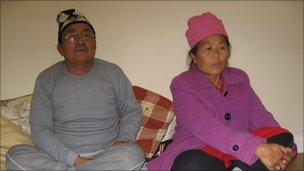
Man Bahadur Sunuwar and his wife are living on a mattress in his cousin's flat
The cases of cousins Jit Bahadur Sunuwar, 70, and Man Bahadur Sunuwar, 67, are typical of the experiences of thousands of other Gurkhas who have moved to the UK, The BGWS says.
Both men and their wives are finding life in the UK an uphill struggle.
They all share a cramped one-bedroom flat in Aldershot which has a tiny kitchen and bathroom.
Man Bahadur Sunuwar and his wife sleep on a mattress in the sitting room.
He says that because he served fewer than 15 years in the British army, he and his wife are not eligible for a Gurkha pension and will rely on a British state pension and housing benefits to live in the UK.
"The trouble is that we are still embroiled in a time consuming battle to get these benefits," Mr Sunuwar told the BBC.
"In order to qualify we must have proof of address. Yet we have no permanent address in England because at the moment we are living on a mattress on my brother's floor.
"The same proof of address is needed to register with a doctor. So far we have not received a single penny from the British authorities since arriving from Nepal and it is a real battle to make ends meet. We don't even have any money to buy groceries and are penniless because we spent all our savings getting here from Nepal."
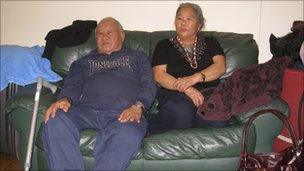
Jit Bahadur Sunuwar can barely walk and does not speak English
Mr Sunuwar says life in the UK is different from what he was told it would be like in Nepal.
"I have to find accommodation," he said, "but in order to do that I will have to pay a deposit and then sign a tenancy agreement for at least six months in advance. Whatever money I do end up receiving from the government is likely to be gobbled up by the rent. It's a very difficult situation."
Mr Sunuwar's older cousin, Jit Bahadur Sunuwar, gets more money than him because he served longer and qualifies for an army pension in addition to a UK state pension and housing benefit.
"The three combined incomes mean that he has about £680 ($1,120) a month - not much considering his rent, council tax and utility bills all have to be paid out of this money," said BGWS General Secretary Chhatrai Rai.
Neither of the couples speak English. For Jit Bahadur Sunuwar that presents extra problems because he needs medical treatment for high blood pressure, arthritis and diabetes.
"Mr Sunuwar is so lame that he has hardly left his sofa in the flat since he and his wife arrived in the UK in September. They are in effect prisoners in their own home," said Mr Rai.
Jit Bahadur Sunuwar has applied to the UK Home Office for his 25-year-old daughter to come to the UK and look after him and his wife, but she has been denied permission because according to the rules she should be under 18 and one of her parents must be earning in the UK.
"This is sad for them because she would be able to look after them, but instead that burden has now fallen on the UK authorities," said Mr Rai.
HOPEFUL DEPENDENT
Muktinath Ghale, 25, is one of more than more 5,000 Gurkha dependents who have arrived in the UK since the Lumley campaign. It is estimated that about half of these dependents are under 40 and actively looking for work.
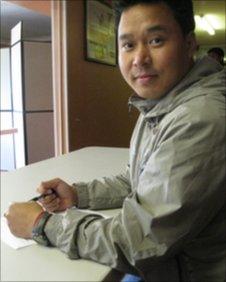
Muktinath Ghale is training to become a security guard
He was allowed into Britain because his wife is the daughter of a Gurkha veteran. He lives in Surrey with her and her extended family.
Mr Ghale is currently training to be a security guard in a scheme run under the auspices of the BGWS in Aldershot.
"I have only been here nine days but I am hugely optimistic," Mr Ghale says. "Everyone in England is so kind and helpful and I am sure I can make a go of my life here and eventually become an accountant."
Mr Ghale says that he intends to work in the UK, get qualified and then go back to Nepal with his wife.
It may work out for Mr Ghale but if the experiences of other dependents of Gurkha soldiers are anything to go by, he may soon become disillusioned.
"Basically to make ends meet these people either have to share cramped accommodation with their extended family or live by themselves and face a financial struggle with rent, utility and food bills," says Mr Rai.
"Add to that the language and cultural differences and for many the UK is anything but the land of milk and honey that he imagined before leaving Nepal."
SUCCESS STORIES
Gurkha veterans and their dependents have moved to all parts of the UK, including the northern English garrison town of Catterick where - in contrast to Aldershot - most say they are very happy to be in the UK.
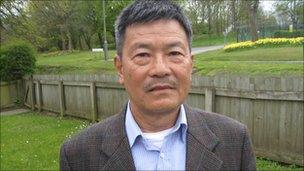
Haridan Rai says that he is delighted to be in the UK
Haridan Rai, 69, is typical. He came to England five months ago with his wife and son.
Because he served in the Gurkhas for more than 15 years he is eligible for a British army pension and a state pension which he says adequately covers his living costs.
"Joanna Lumley's efforts definitely enable me to come here," he says, "and I am forever grateful that she campaigned so diligently.
"Because Catterick is a military town, people are more receptive to Gurkhas and I have been able to feel most at home here.
"In England my son has got a job and my wife and I live in a comfortable rented house. It is a much more comfortable existence than in Nepal, which is plagued by political instability."
Another Gurkha who says he has a lot to thank Joanna Lumley for is Tekbahadur Garung, 74.
He served in the Gurkhas from 1957 to 1969. Because he retired before 1997 he was not allowed to live in the UK.
"But thanks to Joanna's campaign I was finally allowed to join my son - who is currently serving in the Gurkhas - in June last year.
"For me it's a liberation. I am an old man now and do not have to worry who is going to go out and buy my groceries.
"To me Joanna Lumley is a goddess."
- Published31 July 2011
- Published27 July 2010